
1915
Dorking, Epsom & Midhurst A.S.L.E.&F. branches
These three branches opened sometime before 1916
(These branches appear on the A.S.L.E.&F. 1916 Calendar)
First War Bonus negotiated for Enginemen.
Special War Levy imposed, arising from loss of paying members to
H.M. Forces
Membership 33,624
Railway accident on the
L.B.S.C.R.
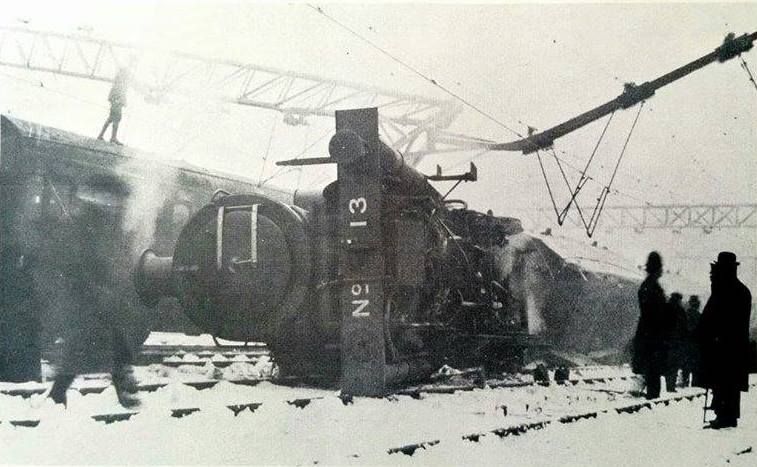
On the Western Front men were living and dying in the rat infested mud of the trenches,
whilst back in ‘Blighty’ a tremendous war effort was being maintained to keep the mincing
machine supplied. Britain’s railways were geared up to carry huge consignments of war
materiel including train load after train load of ‘cannon fodder’ both human and equine;
train load after train load of hay and straw for the horses, rations and supplies for the troops,
guns, munitions and the rest. Also, of course, there was a contra-flow of Ambulance trains
bringing back the wounded and the maimed. Most of this rail traffic converged on the sea
ports of South-East England and Newhaven played a major part of this operation.
Newhaven running shed was one of the smaller depots on the L.B.S.C.R. Before the war it
could only muster a total of only ten locomotives. Under war conditions, Newhaven depot
assumed an importance out of all proportion to its size. It provided running shed facilities for a constant procession of visiting engines which came and went through all hours of the day and night. Almost every one of these locomotives worked into Newhaven with a ‘MOBRAIL’ trains (MOBRAIL was the code-name for a goods train loaded with military supplies). As the war went on, more and more MOBRAIL’s were needed and eventually they were arriving in Newhaven at half-hourly intervals all around the clock.
As the focal point of so much activity during the war, Newhaven running shed simply hadn’t
enough enginemen to cope with all the work. There was only one solution to this problem:
enginemen were drafted in from other depots within the company for 3 or 4 months at a time.
The enginemen had to be available for any turn of duty at any hour of the day or night and
were working seven days per week without having a day off. The enginemen also had to find their own lodgings in Newhaven.
With the need for more manpower some engine drivers such as Bill Coney worked passed
their retirement age of 60 to help ease the manpower shortage and finally retiring at end of
the war in 1918 aged 62.
Extracted and adapted from the book
Yesterdays Once More
by Fred Rich
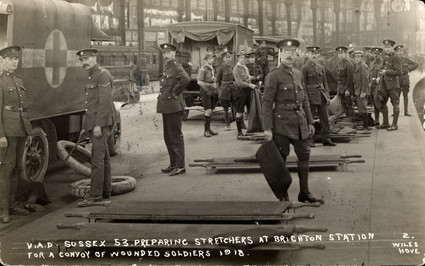
A scene at Brighton railway station
In March 1915 A.S.L.E.F. Organising Secretary Mr. W. Warwick met with Locomotive
Superintendent Lawson Billinton. W. Warwick was the secretary of the Locomotive men's Side Conciliation Board. Billinton explained that it had now been decided to pay enginemen, who were reduced in consequence of the war, their original rate of pay, notwithstanding their being employed on lower grade work. The proviso that all such men must transfer, if required, must, however stand still. Warwick agreed to the proviso was quite reasonable. Billinton stated that the men who transferred would be given first opportunity to go back when normal times come around again. The men would not be moved unless absolutely necessary.
Complaints between the Locomotive men Billinton where not just about pay but also working conditions. On 12th February, 1917, the Locomotive men fielded a major deputation and met with Billinton. attending were E.S. Moore of the Running Department and engine drivers from Battersea, Brighton, Fratton, Horsham, New Cross, St. Leonards and Tunbridge Wells and a fireman from West Croydon. At the outset Billinton suggested that instead of the deputation being called 'A Grievance Committee', some more suitable name such as 'Improvement committee' should be found. The range of subject included:-
Derailments on Lewes turntable.
Billinton promised locking levers would be separated, but after that enginemen would be held responsible for any further derailments.
Space between the down local and turntable road at Montpelier Junction blocked with
permanent way material.
Billinton promised to raise this with the Engineer.
Shedman Kitchin should be given a minimum driver's rate.
Billinton replied that the man was hardly a driver, and it was established that he did not take
his engine more than 200 yards on running lines. he had no objection to Kitchin’s
advancement when possible and when a suitable vacancy occurred.
Distribution of the 4s.9d and 8s. pay rates.
Billinton reminded them of the precedence of men over the local lines and of seniority. The
question of Tunbridge Wells and Three Bridges being classed as main line could not be
definite. The whole point rested with the class of worked carried out.
Seniority arrangements.
The delegation's proposal, Billinton explained, would mean putting up 63 men and putting
down 139, and therefore detrimental to the majority. The men raised problems of seniority
relating to Battersea men transferred to West Croydon, and pointed that the defence of the
realm list, hung up in the shed caused dissatisfaction in the matter.
Punishment of men exceeding speed limits.
Billinton gave particular instances where men had been suspended, pointing out previous
cases against them. In the case of speed limits interfering with the timekeeping of trains to the extent of making the time shown in the time book impossible, the lost time must be explained.
Billinton took the opportunity to elucidate the new method of taking speed by electrical
recorder.
Promotion.
The men proposed that a driver or fireman should be related after working two years or 616
days in the higher grade.
Billinton stated that this was a question largely affected by 'Universal Seniority', but best left
till after the war. The men's point was the difficulty of getting into the second class of the
Pension fund when only approved men, and the delay made back payments heavier.
Shed Day.
The men suggested a reduction of miles to 700 for a shed day of 10 hours. War reductions
were causing a loss shed days, and a large number of excess miles worked in summer might
be carried forward to the winter, It was stated that local men at Brighton got 3/4 day's pay for a shed day by working a trip before washing out. Billinton promised to look into these
entitlements.
Withdrawal of Fogmen.
Billinton had discuss this with Mr. Scott, notwithstanding shortage of labour, but exceptional cases could be brought to the Foreman's notice for consideration.
Guard Signals.
They suggested that the Under Guard should give the white light to the Head Guard when
starting trains. Billinton approved this.
Lodging Allowance.
The men thought the present allowance should be increased owing to War conditions.
Billinton promised to look into the matter; the difficulty was, however, that this matter was
embodied in the terms of service.
Request that the walls of the ash pit at Brighton should be repaired.
Billinton assured that this would be done when the labour was available, and explained that
it was proposed to release the Forces such men as firelighters, washer-out, etc., whose place would be place taken for the time being by firemen not required for traffic.
Request for the opening of the old engine shed pits at Eastbourne.
Billinton could not see the necessity for this view of the small number of engines running into Eastbourne.
Revisions of timings requested.
Billinton said this under consideration but explained 'engines should not be thrashed'. In
connection it was mentioned that the awning at Battersea station, West London line, was
dangerous for men working with the Moguls.
Shortage of overcoats.
Fireman Ede (Midhurst) and Pumping Enginemen Cornwell (Steyning) were instanced. Billinton said enquiries would be made at shed at whether they had a spare overcoat.
Other matters:Disc for crossover roads at West Croydon.
Two place at Victoria where handsignal were necessary.
Question of dangerous position of regulator lubricators on dome.
Billinton pointed out that it was more dangerous to attend to these lubricators than for a
cleaner to clean out the boiler.
A case of tight workings on the 9.25 am to Victoria, arriving Battersea shed about 4.30 pm,
and leaving at 4.53 pm.
Moore was asked to look into it.
More leniency requested for the men at Fratton not using a time recorder
Over to Moore again.
War bonus payments for men off ill or attending deputations.
South Eastern men were paid if a medical certificate was produced. It was asked what the
South Western men were doing in this respect.
Coal for railwaymen.
Billinton promised to enquire regarding coal from the Railway Company for private use.
Complaints by Brighton men of painters taking up a large part of the shed.
Billinton said the painters would be transferred.
Suggestion of trailer coaches being fitted so that the engine could be attached at either end, to save running bunker first.
Exhaust injectors of No.37 not having a stop plug for use in case of obstruction of top clack.
To be investigated.
Extracted and adapted from the book
Lawson Billinton: A Career Cut Short
By Klaus Marx
LOCOMOTIVE JOURNAL
NEW CROSS BRANCH
MARCH 1915
Brother S.D. Smith desires to record through the medium of the Journal the prompt manner in which his claim for suspension pay was dealt with, and strongly advises all his fellow footplate workers to join a Society which has their own welfare so much to the front.
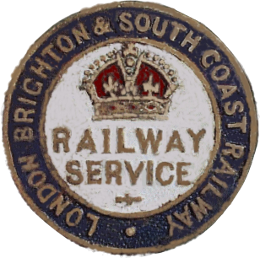
PHOTOGRAPHER UNKNOWN
The L. B. S. C. R. First World War service cloth badge.
The A.S.L.E.F. General Secretary Albert Fox wrote in April 1915 to the War Office.
“Our members are jeered at and even molested in the streets by dockyard workers and
soldiers, because they have not been enlisted. I have no hesitation in asserting that our
members are just as loyal to their country. We have a large number who would have joined if they had not been prevented from doing so by the instructions given from the War Office to the effect that locomotive men must not be enlisted. The whole of our men feel it is not a right thing for them to have to submit to any indignity in the streets or elsewhere because they are not in the Army, when they are prevented from joining the Army, and a request has been made that I appeal to the War Office to supply them with buttons to wear in their coats, to indicate that they are doing their duty for their country. Buttons of this description are obtainable, I understand, from the War Office, and my object in writing this letter is to ask that some arrangement shall be made for supplying our drivers, firemen, and cleaners with these buttons, to prevent any trouble in the future.”
The reply of the War Office, dated April 26th, was that the issue of buttons was restricted for the present to specially skilled workmen of recruitable age in the employ of British armament firms, whose services were indispensable for the execution of certain Government contracts.
The reply of the War Office, dated April 26th, was that the issue of buttons was restricted for the present to specially skilled workmen of recruitable age in the employ of British armament firms, whose services were indispensable for the execution of certain Government contracts.
This badge was finally produced after the railway trade unions put pressure on the government to protect the railway workers from being attacked by the general public who branded railway workers as cowards due to not being seen in military uniform.
However the badges where issued by some of the 100 plus railway companies.
There were an estimated 35 different types of these badges produced by the different railway companies (see below).
Each of these badges were numbered and a recorded list of each employee would have been made.
A badge was issued by the L.B. & S.C.R. to all its employees who were classed as in
“protected occupations” within the Company. Similar badges were issued by other railway companies throughout the country.
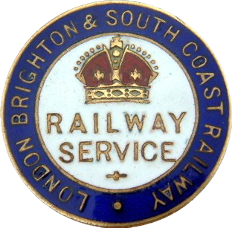
A.S.L.E.&F. MEMBERS AT WAR
By July of 1915, 1,702 A.S.L.E.F. members were serving with the forces, of whom seven had been killed and many wounded.
By the close of 1916 there was 2,678 A.S.L.E.F. members serving with the Army and Navy.
25 Railway Service badges
issued by the following railway companies
The London Brighton & South Coast Railway
The London & South Western Railway
The South Eastern & Chatham Railway
The Great Western Railway
The Somerset & Dorset Railway
The Great Northern Railway
The Cheshire Lines Committee Railway
The Great Central Railway
The Furness Railway
The Joint Railway Badge The Kent & East Sussex Railway, The Shropshire & Montgomeryshire Railway & The Weston, Clevedon & Portishead Railway
The North Eastern Railway
The North Western Railway
The Glasgow & South Western Railway
The Great North of Scotland Railway
The Midland Railway
The Hull & Barnsley Railway
The Midland & Great Northern Joint Railway
The Lancashire & Yorkshire Railway
The Cambrian Railway
The North British Railway
The Great Eastern Railway
The Underground Railway
The Caledonian Railway
FATAL ACCIDENT INVOLVING
PASSED FIREMAN ALFRED LAWERENCE
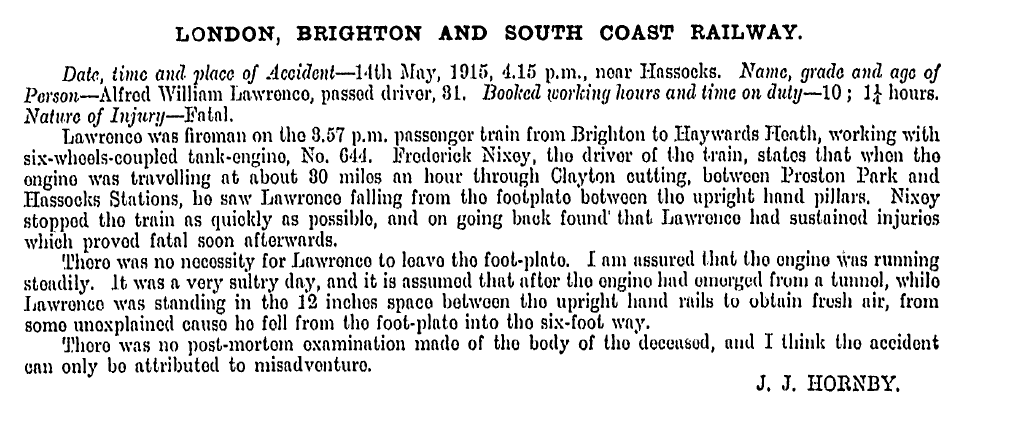
UNIVERSAL SENIORITY
Extracted and adapted from the book
Lawson Billinton: A Career Cut Short
By Klaus Marx
Engine driver Eaves who had been reduced to the lowest driving rate for any firing work,
met Locomotive Superintendent Lawson Billinton on the 17th October 1915. Driver Eaves pointed out that as there were vacancies above him to fill up, Driver Eaves felt that he ought to be considered to fill such vacancies. Billinton had already sent out a letter on the subject of having a 'Universal Seniority', but the loco men in the Southern District did not want a 'Universal Seniority'. Billinton confirmed there would be no higher rate while there were vacancies.
Universal Seniority within the Southern Railway was introduce in 1925